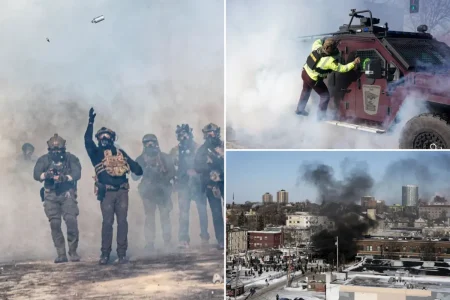Munich Airport Suspends Operations as European Drone Disruptions Continue
European Air Travel Faces New Security Challenge as Drone Incidents Rise
Munich International Airport temporarily suspended all flight operations Tuesday morning following multiple drone sightings in its airspace, marking the latest in a series of similar incidents across European transportation hubs. Aviation authorities implemented the precautionary measure at Germany’s second-busiest airport shortly after 6:00 AM local time, affecting dozens of inbound and outbound flights during the morning rush hour. The suspension lasted approximately three hours before operations gradually resumed, though passengers faced cascading delays throughout the day.
This incident comes amid growing concerns among European security officials about what appears to be a coordinated campaign of drone-related disruptions targeting critical infrastructure. Senior German officials, speaking on condition of anonymity due to the sensitivity of ongoing investigations, suggested the timing and pattern of these incidents bear hallmarks of sophisticated interference rather than isolated events. “What we’re witnessing follows a troubling pattern that extends beyond coincidence,” said Carsten Weber, head of the German Aviation Security Association. “The precision timing during peak travel periods suggests an intent to maximize economic disruption and erode public confidence in transportation systems.”
The Munich incident mirrors similar disruptions at Frankfurt Airport last month and at facilities in Poland, the Baltic states, and Scandinavia throughout the summer. European security services have increasingly pointed to potential Russian involvement in these incidents, citing intelligence assessments that suggest the drone appearances may be part of a broader hybrid warfare strategy. Officials from multiple EU countries have characterized these actions as deliberate attempts to test airport security protocols, gather intelligence on response procedures, and create economic damage without crossing thresholds that would trigger more forceful responses. NATO Secretary General Mark Rutte addressed the situation during a press briefing in Brussels, stating that the alliance is “deeply concerned about the pattern of infrastructure interference” and is working to develop coordinated countermeasures.
Russia Denies Allegations as International Tensions Rise
Moscow has categorically rejected accusations of involvement in the drone incidents. Kremlin spokesman Dmitry Peskov dismissed the claims as “unfounded allegations designed to create hysteria” and “another example of the West’s determination to blame Russia for all problems.” The Russian Embassy in Berlin issued a strongly worded statement calling the suggestions “provocative and irresponsible,” while demanding evidence before what it termed “diplomatic escalation.” Despite these denials, European intelligence communities have observed increased signals intelligence activity coinciding with several of the drone appearances, according to two senior security officials familiar with the ongoing investigations.
The drone incidents have emerged against a backdrop of deteriorating relations between Russia and Western European nations, particularly Germany, which has become one of Ukraine’s largest military supporters in the conflict with Russia. Political analysts suggest the timing may not be coincidental, as European parliaments debate new aid packages for Ukraine and additional sanctions against Russian entities. “These incidents create psychological pressure and economic costs without leaving clear fingerprints,” explained Dr. Helena Müller, a security studies professor at the University of Munich. “They represent the gray zone of modern conflict—actions designed to remain below the threshold of armed attack while still advancing strategic objectives.” The European Commission has announced the formation of a specialized task force to coordinate responses to what it termed “infrastructure security challenges,” though it carefully avoided attributing blame for the recent incidents.
The economic impact of these disruptions extends far beyond the immediate inconvenience to travelers. Munich Airport serves as a crucial hub for business travel and cargo operations throughout Central Europe, with each hour of suspended operations costing airlines and related businesses millions of euros. Lufthansa Group, which operates a significant portion of flights through Munich, reported that Tuesday’s disruption affected over 15,000 passengers and required the cancellation of 78 flights, with delays affecting hundreds more throughout its network. The broader economic consequences include disrupted supply chains, missed business opportunities, and diminished confidence in air travel reliability. Tourism industry representatives have expressed concern about potential long-term impacts if these incidents continue or expand to additional transportation infrastructure.
Security Experts Call for Enhanced Drone Detection and Mitigation Systems
Aviation security experts emphasize that airports across Europe must accelerate the implementation of advanced drone detection and countermeasure technologies to address this emerging threat. “The current generation of airport security systems was designed primarily to address traditional threats like terrorism, not the strategic deployment of commercial drones,” explained Brigitte Schumann, director of the European Aviation Security Center. “We need rapid investment in integrated solutions that can detect, identify, track, and if necessary, safely neutralize unauthorized drones without creating additional risks to air traffic.” Several European airports have begun deploying experimental systems that combine radar, radio frequency detection, and optical sensors to provide early warning of drone intrusions, though comprehensive protection remains challenging due to the small size and increasing sophistication of commercially available drones.
German Interior Minister Nancy Faeser announced that federal security agencies would be conducting a thorough review of critical infrastructure protection protocols in response to the Munich incident. “We must adapt to evolving threats with both technological solutions and enhanced coordination between civilian authorities and military resources,” Faeser stated at an emergency press briefing. “The protection of our citizens and critical infrastructure remains our highest priority.” The European Union Aviation Safety Agency (EASA) has convened an emergency meeting of national aviation authorities to develop standardized response protocols and accelerate the certification of counter-drone technologies suitable for airport environments. Meanwhile, passengers traveling through major European hubs are advised to allow additional time for potential security disruptions and to verify flight status before departing for airports.
As investigations continue into the Munich incident and similar disruptions across Europe, security analysts warn that drone-related interference with critical infrastructure likely represents an enduring challenge rather than a temporary phenomenon. The relatively low cost and growing capabilities of commercial drone technology, combined with the high potential for disruption, make these tactics particularly attractive for actors seeking asymmetric advantage. European officials acknowledge privately that completely eliminating this vulnerability may prove impossible, suggesting that resilience and rapid response capabilities will be as important as prevention measures. “We’re dealing with a new normal in infrastructure security,” concluded Weber. “The goal must be to minimize disruption while demonstrating that such actions ultimately fail to achieve their strategic objectives.”










